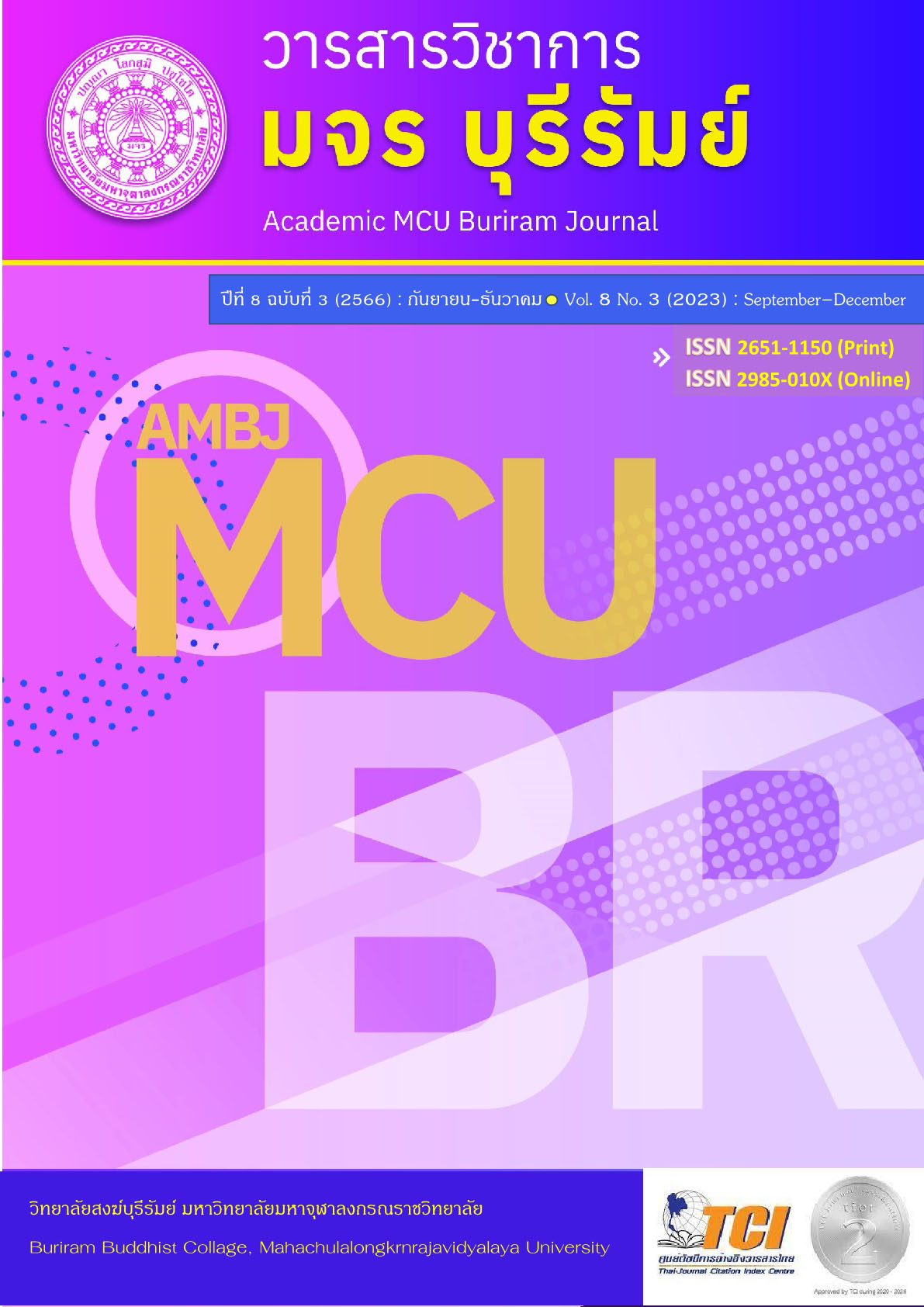An Evaluation of the Student Support System Project of Education Expansion Schools in Phawo-Dan Mae Lamao School Cluster under Tak Primary Education Service Area Office 2
Keywords:
Project Evaluation, Student Support System, Education Expansion SchoolAbstract
The purpose of this research were: 1) to evaluate the opinion on the input factors of the Student Support System Project of education expansion schools in Phawo-Dan Mae Lamao School Cluster under Tak Primary Education Service Area Office 2; 2) to evaluate the opinion on the process of the Student Support System Project of education expansion schools in Phawo-Dan Mae Lamao School Cluster under Tak Primary Education Service Area Office 2; and 3) to evaluate the opinion on the output factors of the Student Support System Project of education expansion schools in Phawo-Dan Mae Lamao School Cluster under Tak Primary Education Service Area Office 2. The research informants totaling 686 persons comprised four following groups: The first group included 58 purposively selected school administrators and teachers. The second group included 42 purposively selected basic education school board members. The third group included 293 students obtained by stratified random sampling. The fourth group included 293 parents obtained by stratified random sampling. The instruments used for data collection were a questionnaire and an interview form. The data were analyzed using the mean, standard deviation, and content analysis.
The research results found that:
1. regarding the input factors of the project, the readiness and resources factor in total was evaluated to be at the high level, which was considered to pass the evaluation criteria; while the student problems in total was evaluated to be at the moderate level, which was considered to pass the evaluation criteria.
2. The operational process of the project consisting of the acquaintance with each individual student, the screening of students, the promotion and development of students, the prevention and solving of students’ problems, and the reference of students, all of which were evaluated to be at the high level, which was considered to pass the evaluation criteria.
3. The output factors of the project consisting of the students knowing how to rely on themselves, the students loving and realizing the values of oneself and the others, the students having good physical and mental health and good sanitation, the students’ avoidance of bad behaviors, the students having honest occupational skills, and the students being good members of the society, all of which were evaluated to be at the high level, which was also considered to pass the evaluation criteria.
References
กรมสุขภาพจิต กระทรวงสาธารณสุข. (2546). คู่มือการบริหารระบบการดูแลช่วยเหลือนักเรียนช่วงชั้นที่ 1-2 (ชั้นประถมศึกษาปีที่ 1-6). สำนักพัฒนาสุขภาพจิต กรมสุขภาพจิต.
ถนอมชัย เวียงสิมา. (2564). การประเมินโครงการพัฒนาระบบดูแลช่วยเหลือนักเรียนของโรงเรียนวัดราษฎร์บำเพ็ญ (กริ่ง สง่า ศิษย์อุปถัมภ์) อำเภอนครหลวง จังหวัดพระนครศรีอยุธยา. รายงานผลการประเมินโครงการ. พระนครศรีอยุธยา.
ธวัชชัย โคตรสุโน. (2563). การประเมินโครงการระบบการดูแลช่วยเหลือนักเรียนโรงเรียนบ้านโพธิ์ชัยดอกคำ สังกัดสำนักงานเขตพื้นที่การศึกษาอุดรธานี เขต 2. รายงานผลการประเมินโครงการ. อุดรธานี.
ธวัชชัย อภิเดชกุล. (2560). พฤติกรรมและผลกระทบจากการดื่มแอลกอฮอล์ในกลุ่มเยาวชนชาวเขาเผ่าลาหู่และอาข่า (ระยะที่ 1). ศูนย์ความเป็นเลิศการวิจัย สุขภาพชนชาติพันธุ์ สำนักวิชาวิทยาศาสตร์สุขภาพ: มหาวิทยาลัยแม่ฟ้าหลวง.
ธีรเดช สายเส็น. (2555). การประเมินโครงการระบบดูแลช่วยเหลือนักเรียนโรงเรียนกิตติวิทยานุสรณ์ อำเภอเมือง จังหวัดกระบี่. รายงานผลการประเมินโครงการ. กระบี่.
พระราชบัญญัติคุ้มครองเด็ก พ.ศ. 2546. (2546, 24 กันยายน). ราชกิจจานุเบกษา. เล่ม 120 ตอนที่ 59 ก, หน้า 24.
มูลนิธิกระจกเงา โครงการพิพิธภัณฑ์ชาวเขาออนไลน์. (2007). ชนเผ่าลาหู่–การแต่งงาน. เข้าถึงได้จาก https://www.hilltribe.org (สืบค้นเมื่อ 28 มีนาคม 2561).
เยาวดี รางชัยกุลวิบูลย์ศรี. (2553). การประเมินโครงการ: แนวคิดและแนวปฏิบัติ. พิมพ์ครั้งที่ 7. กรุงเทพฯ: สำนักพิมพ์แห่งจุฬาลงกรณ์มหาวิทยาลัย.
สุนันท์ โพธิบาย. (2552). การประเมินโครงการระบบดูแลช่วยเหลือนักเรียนในโรงเรียนขยายโอกาสทางการศึกษา สังกัดสำนักงานเขตพื้นที่การศึกษาหนองบัวลำภู เขต 1. วิทยานิพนธ์ปริญญาการศึกษามหาบัณฑิต สาขาวิชาการวิจัยการศึกษา. มหาวิทยาลัยมหาสารคาม.
Gunderson, J. (2000). The family group conference: An innovative approach to truancy in schools. In the National Roundtable on Family Group Decision Making: Summary of Proceedings in Madison. Wi. Englewood. CO: American Humane Association.
Jackson S.M. (2015). The effects of a cognitive-behavioral group counseling intervention that emphasizes self-management techniques on the classroom behavior and self-efficacy of middle school students. Dissertation Abstracts International. Walden University Barbara Solomon School of Social Work and Human Services, Minneapolis.
Owen Thomas. (1974). A Study to Determine the Effect of Selected Behavior Modification Techniques on Performance of Non-Attending, Non-Achieving Junior High School Students. Dissertation Abstracts International. University of Birmingham School of Chemical Engineering. 34, 4. 6318-6319 A.
Walton, Connie. (2007). The Effectiveness of Using a Student Monitoring System to Improve a School District’s State Test Scores. Dissertation Abstracts International. Academic Affairs. Grambling State University.
Downloads
Published
How to Cite
Issue
Section
License
Copyright (c) 2023 Academic MCU Buriram Journal

This work is licensed under a Creative Commons Attribution-NonCommercial-NoDerivatives 4.0 International License.
ทัศนะและความคิดเห็นที่ปรากฏในบทความวารสารฉบับนี้ถือเป็นความรับผิดชอบของผู้เขียนบทความนั้น ไม่ถือเป็นทัศนะและความรับผิดชอบของบรรณาธิการ





